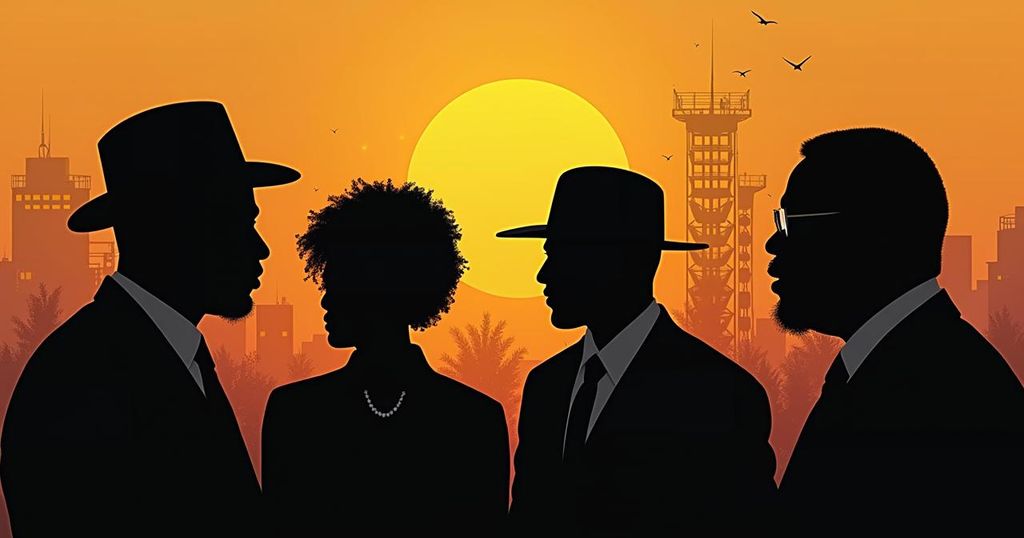Mozambique’s Crucial Elections: A Call for Change Amidst Conflict and Corruption
Mozambique’s elections on Wednesday may herald the advent of a younger president, marking a significant political shift since independence in 1975. Around 17 million voters will decide not only the presidency but also parliamentary seats amid a backdrop of insecurity, economic challenges, and widespread disillusionment with the incumbent leadership. Four main candidates represent a spectrum of political experience and aspirations, notably addressing the pressing issues of armed conflict, unemployment, and climate resilience.
Mozambique’s upcoming elections, set for Wednesday, hold the potential for the election of a president born after the country’s independence from Portuguese rule in 1975. Approximately 17 million of Mozambique’s 32 million citizens are eligible to participate in this pivotal moment for the nation, as both parliamentary and provincial elections will occur concurrently across the country’s 11 provinces. President Filipe Nyusi of the Mozambique Liberation Front (Frelimo), who has been in office for eight years, is stepping down. Nyusi could represent the last of the pro-independence fighters to serve as president, given his association with Frelimo’s historical legacy that includes involvement in the grim liberation war that claimed numerous lives. His administration has been marred by a significant corruption scandal—the tuna bond affair—leading to arrests of high-ranking officials, including a former finance minister convicted abroad. As the election approaches, the electorate appears divided. While many voters are eager for change and reject the old political establishment, particularly among the youth, some older citizens remain hesitant to break from the familiar system. The four candidates vying for the presidency include: 1. Daniel Chapo, age 47, current Frelimo leader and the perceived frontrunner. Chapo began his political journey in 2011, quickly ascending within Frelimo and promising to restore peace to the conflict-ridden Cabo Delgado province during his six-week campaign. Despite his incumbency advantage, Chapo struggles to distance himself from Frelimo’s corrupt reputation. 2. Ossufo Momade, age 63, leader of the opposition party Renamo, which commands only a small number of parliamentary seats. Momade’s historical role in the civil war and previous leadership during peace negotiations lends him credibility among some voters, even as he retains ties to the past. 3. Venancio Mondlane, age 50, an independent candidate with solid backing from the Democratic Alliance Coalition (CAD). His youthful appeal resonates with the younger demographic, which constitutes a significant portion of the voter base. Mondlane has also committed to addressing the violence in Cabo Delgado. 4. Lutero Simango, age 64, who leads the Democratic Movement of Mozambique (MDM), aims to create jobs through local resource processing initiatives. The elections also constitute a critical moment for voters to select 250 parliamentary members and provincial authorities. Key issues dominating the electoral discourse include: – Armed Conflict: The ongoing violence in Cabo Delgado, which has persisted since 2017. The emergence of a local insurgency related to ISIL has resulted in staggering casualties and displacement. – Economic Challenges: With two-thirds of the population under 25 and unemployment rates soaring, job creation strategies are paramount. The World Bank indicates that poverty levels have surged, exacerbated by the pandemic and previous corruption scandals. – Climate Resilience: The candidates are expected to address the pressing issue of food insecurity and the need for sustainable development in a country prone to extreme weather events. Vote counting will commence immediately after the polls close, with preliminary results expected shortly thereafter, while official results will be released within 15 days. Parties have the right to contest the outcomes if they deem necessary.
The elections in Mozambique are framed against a backdrop of significant socio-political challenges, including a history marked by corruption and armed conflict. Following decades of governance by the Frelimo party, which emerged from the country’s liberation struggle, citizens are now ready to transition toward younger leadership amidst demands for economic opportunity and security. The complexity of the electoral landscape is further compounded by the rise of discontent with the ruling party and the evolving needs of the nation’s youth, widely affected by unemployment and violence. The context of the elections is not only a test of political evolution but also a crucial juncture for the people of Mozambique as they seek stability and governance that resonates with their aspirations.
In conclusion, Mozambique’s upcoming election represents a critical turning point for the nation, with the potential to usher in a younger leadership that reflects the changing dynamics of its populace. With pressing issues such as armed conflict, economic hardship, and climate vulnerabilities occupying the forefront of voter concerns, the results of this election could significantly influence the country’s trajectory. The diverse candidates demonstrate differing visions for Mozambique’s future, making the dialogues around this election a vital part of the nation’s pursuit of democracy and development.
Original Source: www.aljazeera.com




Post Comment